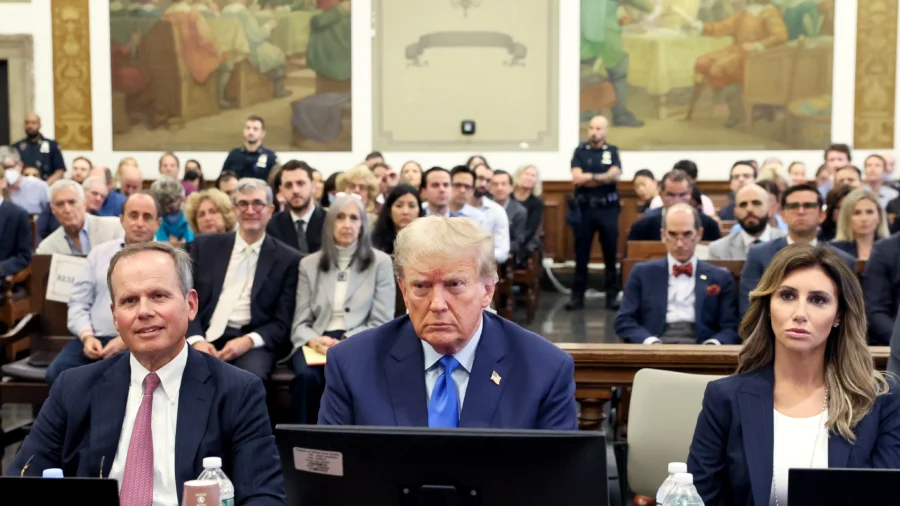Former President Donald Trump made an unprecedented court appearance on Oct. 2 at the famed courthouse on 60 Centre Street.
“I want to watch this witch hunt myself,” he explained after giving remarks during the lunch break. “I’ve been on their witch hunt for years, but this is now really getting dirty.”
The former president is also the frontrunner in the presidential campaign polls by far, and maintains he’s done nothing wrong and the case was politically motivated.
He said his opponents had been “very successful” in their attack, as “they took me off the campaign trail because I’ve been sitting in this courthouse all day long.”
In total, the former president defended himself four times in media appearances, before and after day one of the trial, and during breaks. There were no cameras allowed in the courtroom, save for a brief few moments at the start of the day when New York Supreme Court Justice Arthur Engoron allowed pool cameras in.
7 Charges
New York Attorney General Letitia James sued President Trump last September (pdf), after three years of investigation, claiming he defrauded banks and insurers in the state of New York. She is seeking $250 million in penalties and to bar the former president and his adult sons from holding executive business posts in the state. Attorney Kevin Wallace with the New York Attorney General’s office is prosecuting the case.
On Sept. 26, Justice Engoron issued a pretrial summary judgment on one of Ms. James’s claims—that President Trump inflated his net worth by anywhere between $812 million and $2.2 billion during the years from 2011 and 2021—and found him liable for “persistent and repeated fraud.”
The trial will deal with the remaining six “causes of action” against him as well as the penalties President Trump will owe, including the dissolution of the Trump Organization and its related LLCs.
The remaining causes are: falsifying business records, conspiracy to falsify business records, issuing false financial statements, conspiracy to falsify false financial statements, insurance fraud, and conspiracy to commit insurance fraud.
In the first cause, for which Ms. James requested a summary judgment, the state did not need to prove harm or that the Trump Organization’s financial statements were “materially false.” This is not the case for the other charges.
Judge Engoron asked about how much overvaluation would qualify as “material,” and defense attorneys for President Trump said experts should be called on to testify to the valuations, taking issue with the summary judgment.
The prosecutors are seeking disgorgement of the difference between the regular commercial loan rate and the favorable rates the Trump Organization obtained based on their overvaluations. Attorneys for President Trump argued they were “undervalued” given his brand’s value.
Statute of Limitations
In press remarks, President Trump repeatedly invoked a June ruling from an appeals court, which set the statute of limitations to transactions completed after Feb. 6, 2016, and claims accrued after July 13, 2014. Ivanka Trump was dismissed as a defendant after this ruling because she stopped working for the Trump Organization in 2016.
He and his attorneys said that the new timeframe dismisses about “80 percent” of the case against him, and he has sued Justice Engoron for allowing the case to go forward without taking that into account. The prosecutors have argued that annual statements indicative of fraud in the allowed period may be connected to those earlier statements and transactions.
After opening arguments from the prosecution and defense, the court took a break for lunch. After lunch, the state called upon their first witness, Donald Bender, former Mazars accountant who prepared tax documents and did accounting for the Trump Organization.
Mr. Bender’s entire testimony was about a 2011 Mazars Statements of Financial Condition letter. President Trump’s attorney Christopher Kise objected to the testimony, arguing that it fell outside of the statute of limitations defined by the appeals court.
Justice Engoron allowed the testimony, but acknowledged Mr. Kise’s point, telling the prosecutors that they would have to tie the 2011 letter to something within the statute of limitations, or else this entire testimony would have just been a “waste of time.”
Mr. Bender was not cross-examined on day one. The court adjourned around 4:30 p.m. and Mr. Bender’s testimony will continue into day two.
President Trump said he appreciated the judge’s statement taking the statute of limitations into account in his remarks at the end of the day. He said he may return to court, but “would love not to. I’d love to be campaigning.”
“Banks loved our business, they loved our deals, they weren’t defrauded, they lost no money,” he said. “They made a lot of money and they considered me a very good client.”
Mr. Kise had noted that banks did their own analyses, and did indeed come to lower evaluations, but still proceeded with loans in those cases. He said he plans to call four witnesses from Deutsche Bank to testify that the bank was not defrauded, and call NYU professor Eli Bartov to testify on the real estate valuations.
From The Epoch Times

